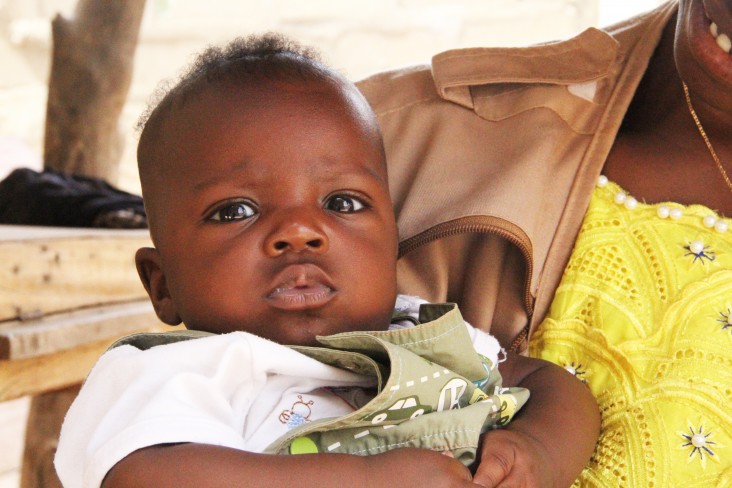Speeches Shim

Ambulatory kangaroo mother care consists of close monitoring of the premature baby to monitor weight, breastfeeding, andcheck for danger signs during periodic visits to the health facility while the mother carries the baby skin-to-skin on her chest during the course of her regular daily and nighttime activities.
Prematurity is one of the leading causes of newborn deaths. In Mali, 29% of neonatal deaths are due to babies born before 37 weeks of gestation. Kangaroo Mother Care (KMC) is an intervention where the mother carries her baby skin-to-skin at the chest, with breastfeeding support and close monitoring by a health provider. KMC gives a chance to premature babies or those born low birth weight to survive and thrive, especially in countries where access to specialized neonatal care services are still lacking.
The USAID-funded Services de Santé à Grand Impact supports the Ministry of Health to improve the quality of maternal and newborn health services through training, supervision and coaching on obstetric and neonatal care, including KMC. Mariam Coulibaly, a midwife at the Sanankoroba Community Health Center in the Health District of Kalabancoro, received training on KMC in May 2016. She in turn trained her colleague, Ms. Madioula Sy, also a midwife, on KMC. The two midwives are recognized for their commitment and are proud of their abilities to take care of low birth weight newborns.
“When the midwife informed us that my Manzou was under the weight of a normal newborn baby (2500 g), I was a little desperate, but at the first follow-up appointment, with his weight gain of 50g, we redoubled the courage because my baby must survive.” - Vincent Diarra, father of the premature baby
This enthusiasm enabled them to successfully manage 12 low birth weight newborns between August 2016 and December 2018. Among them is the son of Mrs. Roucky and Mr. Vincent Diarra. At 29 weeks pregnant in her 9th pregnancy, Roucky, 38, had complications and was referred to the National Hospital where she gave birth to Manzou on December 6, 2018, to a newborn of 1850 g via Caesarean section. After seven days in the hospital, she returned to the Sanankoroba Community Health Center, where Manzou was placed and followed in ambulatory KMC by midwife Madioula. This outpatient approach requires parents to visit the health facility twice a week for weight monitoring, breastfeeding and checking for danger signs such as fever or infection.
“When the midwife let us know that my Manzou was under the weight of a normal newborn baby (2500 g), I felt hopeless, but at the first follow-up appointment, with his weight gain of 50 g, we redoubled our efforts because my baby must survive. I even carried him in KMC on my chest”, explains Vincent Diarra, the father.
The proximity to the Community Health Center allowed the couple to follow the appointments set twice a week for three weeks of follow-up. On, January 7, 2019, Manzou weighed 2600g.
According to Madoulia, the midwife who monitored baby Manzou, the KMC training offered by the USAID Project has been very helpful. “I feel proud when I manage to help parents save their low birth weight babies. Before the training, we referred premature babies to the Gabriel Toure Hospital in Bamako and if the parents did not go, the child returned home but I feared for their futures. But now, with the training I have had and the results I have seen, I can tell parents with confidence that their little babies can survive by practicing KMC.”
Since 2015, SSGI has trained 931 providers of 466 health facilities on KMC. Between 2015 and 2018, 48% of babies born with low birth weight were cared for with KMC in facilities supported by USAID. The High Impact Health Services is a 5-years project of $46 million aiming to reduce or eliminate maternal, newborn, and child deaths in Mali. The project is implemented in Kayes, Koulikoro, Sikasso regions, six communes of Bamako and Gao district. It provides support to 37 district hospitals, 762 primary health facilities and approximately 6,900 villages. It works with 1577 community health workers and more than 17, 200 community volunteers.

Comment
Make a general inquiry or suggest an improvement.